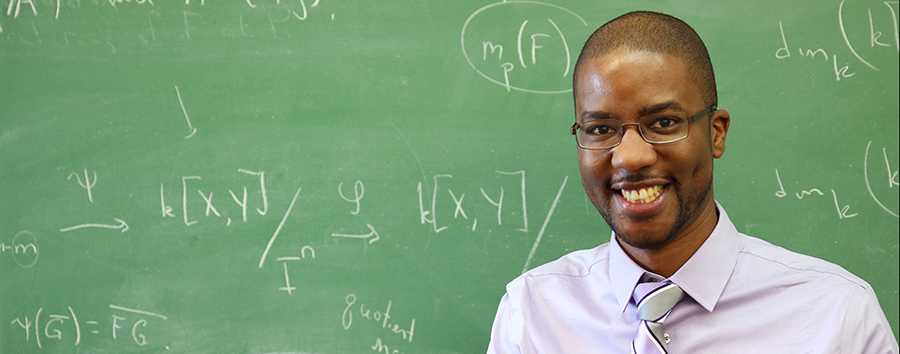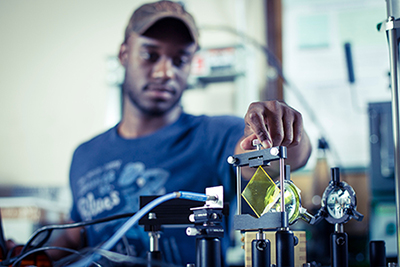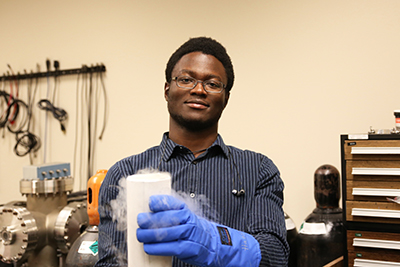by Julie Lineback

In an area seemingly dominated by men, science, technology, engineering, and math (STEM) fields still come up lacking. While it is true that the STEM world is a “man’s world,” it’s not true for one demographic—African-American men. University of West Georgia’s Dr. Christopher Jett aims to break down those barriers with his recent research on how racial issues impact and influence the teaching and learning of math.
“There seems to be a lot of stereotypes about black men,” Jett said. “If you watch the news they will say black men are thugs and black men are not intelligent. My research takes a different approach and looks at things that are right. Like what mathematical strengths do they have? How can we not only accentuate that but learn from that so that we might be able to help other students who have some interest in math?”
This is a topic Jett is personally vested in, as he himself is an African-American in the STEM field. Jett has always had a head for numbers. In elementary school, family and church members would come to him for help with math. His interests were further solidified when he attended a math and science academy in high school and got his bachelor’s and master’s degrees in mathematics at Tennessee State University, a historically black college, and then his Ph.D. at Georgia State University. Today, Jett is an assistant professor of mathematics education at UWG and is the recipient of a National Science Foundation (NSF) CAREER grant. The CAREER grant is the most prestigious and competitive award offered by the NSF in support of junior faculty.

College of Science and Mathematics Dean Dr. Lok Lew Yan Voon, himself a past NSF CAREER award winner, said the grant signifies not only what Jett has accomplished in the past but also influential contributions he will make in the future.
“With over 30 percent of the student population at UWG being African-American, Dr. Jett’s proposed research on their success in the STEM disciplines underlies our commitment to inclusive excellence and student success,” Lew Yan Voon said.
The opportunity funded by the NSF will allow Jett to address the shortage of African-American males in STEM majors and focus on improving efforts to recruit, retain, and advance future generations in addition to providing insights into potential career paths. According to the most recent data from NSF, in 2014 African-Americans only represented around 6 percent of the science and engineering bachelor’s degrees awarded to men, 5 percent of the science and engineering master’s degrees awarded to men and 4 percent of the science and engineering doctorate degrees awarded to men.
“If you want to be successful in mathematics as a black man, specifically, it would be wise to start with some of the black men who have demonstrated success in math,” he said. “My research looks into these black men in hopes of providing insights to broadening the mathematics pipeline.”
In this five-year study, each year will focus on the experiences of black men in four separate institutions—Morehouse College, Clark Atlanta University, Georgia Institute of Technology and Georgia State University.
“The really great thing about my research is that these are really different types of institutions,” Jett said. “The first institution is an HBCU, second is a research institution, the third is a predominantly white, urban research university, and the fourth is an all-male HBCU. The unique thing about this study is it’s the first kind where I’m comparing and contrasting institutional factors as well as whether or not they contribute to students’ persistence in STEM.”
The fifth year will be spent analyzing the data and giving a comprehensive account of this work, he explained.
His research takes a qualitative approach, drawing heavily from interviews with black men regarding their math experiences in their own words. Currently in the first year of his project, Jett said he is already gaining insight.
“A lot of the black men in my study were critical of the K-12 academic terrain, and many of them expressed that the high school mathematics preparation did not prepare them well for college, which was a shock for me,” he observed. “Because they are mathematics majors, you would think that they would’ve been well prepared to study math in college.”
The study at Morehouse College has also allowed him to observe the strength of learning communities, which are groups of students who share common academic goals and work together throughout their college careers.

“When you have people talking about math, writing proofs, and debating mathematical theorems, that leads to the richness that’s associated with math and the conceptual understandings of math,” he said.
Another item Jett has noticed with his Morehouse study is how critical a role faculty plays in exposing students to research and attracting them to certain majors.
“The students really applauded the faculty members,” he revealed. “They found that the faculty members were excited about math and teaching math, and I think that excitement is contagious and transferred to the students.”
The latter point holds true for Jett as well. Joining him on this journey is Ciara Boyd, a graduate student who is pursuing her Master of Science in applied mathematics and whose ambition is to be a professor. Underrepresented in the STEM field as well, she’s excited to take part in the study.
“To be able to go out and meet other people of color in STEM and discussing their experiences with STEM is intriguing,” she said. “African-American males receive a lot of negative attention, so it’s nice to see them being recognized for their current and past accomplishments concerning STEM. This research proves that black men are in STEM fields and continue to further their education after undergrad.”
As part of the project, Jett also plans to establish an African-American Male Mathematics Network (AAMMN) to support STEM undergraduate students that will serve as a national model for other institutions with similar research and education goals.
“What I’m proposing with this network is to bring these institutions and black men together to support one another in our various math trajectories,” he explained. “Five years from now, the students who are undergraduates now will have graduated. Some may be in graduate programs, and some may be mathematicians. I think it'll be interesting to see how their mindsets change about things in the field.”
Jett is the first faculty member at UWG to receive a NSF CAREER grant and said he is humbled.
“My work could be deemed so significant that it could influence what people are doing in math programs,” he concluded. “I can’t put into words just how great of an opportunity this is.”
Posted on